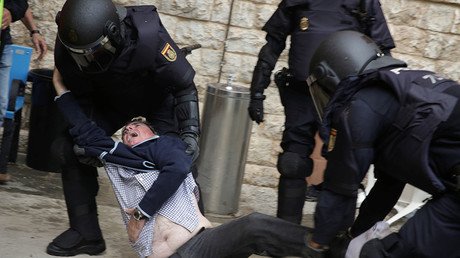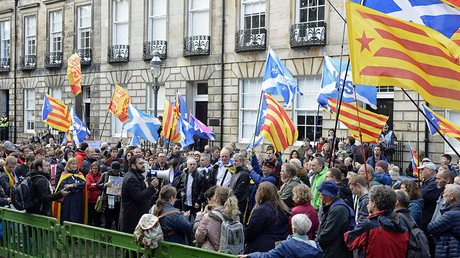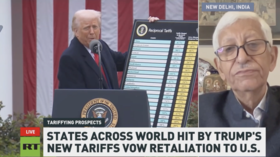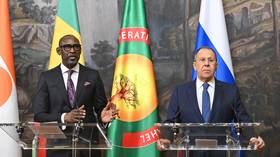‘Violence can never be an instrument in politics:’ EU belatedly reacts to Catalonia crackdown
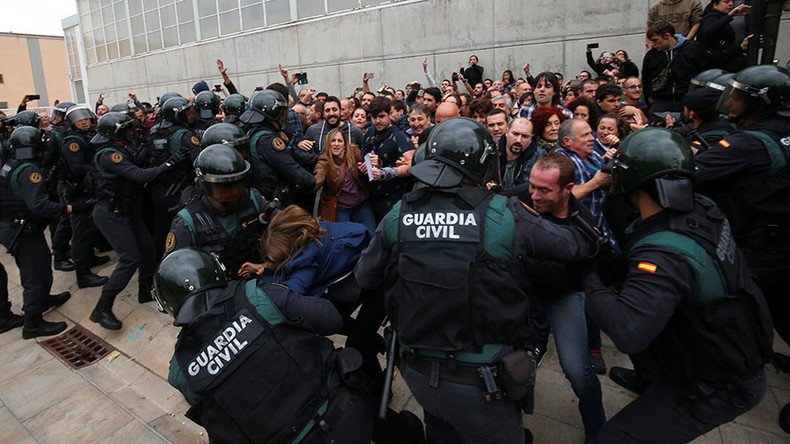
It took the European Commission more than a day to respond to Sunday’s violence in Catalonia, in which a police crackdown on voters left some 900 people injured. The EU Council president has urged the Spanish PM to avoid further “escalation” and “use of force.”
“Sharing his constitutional arguments, I appealed for finding ways to avoid further escalation and use of force,” Tusk tweeted on Monday, following a conversation with the Spanish premier.
“We call on all relevant players to now move very swiftly from confrontation to dialogue,” the European Commission also said in a statement on Monday.
“Violence can never be an instrument in politics,” it said, adding that it is incumbent on Spanish Prime Minister Mariano Rajoy “to manage this difficult process in full respect of the Spanish Constitution and of the fundamental rights of citizens enshrined therein.”
More 890 people suffered injuries from police brutality during the vote for Catalonian independence from Spain, according to the regional government. Madrid does not recognize the referendum and justifies the police actions, saying that they “performed their duty” in Catalonia.
The federal law enforcement used rubber bullets and batons against the citizens during multiple violent attacks.
Despite multiple pieces of footage featuring the brutal actions, no official statement has been made by any of the European Union officials as of Monday morning.
Some EU Parliament parties have already decried the violence during the Catalonian referendum. The Confederal Group of the European United Left/Nordic Green Left wants to raise the issue during the Monday meeting, calling on the body to protect the rights of Catalans.
The president of the GUE/NGL group in the European Parliament, Gabi Zimmer, said that the EU cannot ignore “the shocking scenes” and tolerate “attacks on democracy.”
Greens in the European Parliament also strongly condemned the attacks on peaceful voters.
We strongly condemn de violence against peaceful people trying to vote in Catalunya! https://t.co/HR43heyHK4#CatalanReferendum
— Greens in the EP (@GreensEP) October 1, 2017
The Catalan referendum and the violence surrounding it has reached the agenda of the EU Parliament. The discussion was proposed by EU Parliament President Antonio Tajani and supported by the overwhelming majority of MEPs. Hearings on the issue are scheduled for Wednesday afternoon.
The UN also responded to the violence in Catalonia on Monday as High Commissioner for Human Rights Prince Zeid bin Ra’ad called on the Spanish government to resolve the Catalan question “through political dialogue with full respect for democratic freedoms.” He also wants the authorities to investigate “all acts of violence” related to the referendum.
Comment by UN Human Rights Chief #Zeid on the situation in Catalonia, Spain https://t.co/XSLhdLaLaUpic.twitter.com/umTZBBUxzh
— UN Human Rights (@UNHumanRights) October 2, 2017
Madrid for its part may trigger article 155 of the Spanish constitution, allowing it to strip Catalonia of its autonomy should the region declare independence, according to Justice Minister Rafael Catala.
“Article 155 is there; we will use the entire force of the law. Our obligation is resolve problems and we will do it, even though using certain measures might hurt. If someone declared independence, well, we would have to tell them that they can't," Catala said during an interview with Spanish television, as cited by Reuters.
Most leaders of EU member states have not offered any reaction to the situation in Catalonia. Scottish First Minister Nicola Sturgeon was among the earliest to condemn the police brutality, saying it was “shocking” and “unnecessary” and calling on Madrid to let people “vote peacefully.”
Scotland is a part of the UK, but is contemplating a second referendum on its independence.
On Monday, Germany also stressed the necessity of dialogue between Spanish central and regional governments, urging the sides to "keep calm."
"The images that reached us yesterday from Spain show how important it is to interrupt the spiral of escalation," German Foreign Minister Sigmar Gabriel said, according to Reuters.
Meanwhile, the Madrid and Catalonian authorities have not had any dialogue over Sunday’s events. On Monday, Catalonia's leader, Carles Puigdemont, called for talks to start with Prime Minister Mariano Rajoy. He also wants the EU to mediate the disputed independence referendum with the central government, Reuters reports citing the president.
On Sunday, 90 percent of Catalans voted in favor of independence from Spain, despite the federal authorities’ attempts to thwart what they considered an “illegal” referendum. The massive police crackdown prevented an estimated 770,000 people from voting, according to the Catalan government.
